General Information
Sickness in Pregnancy
We understand that feeling sick for some or all of the day can be horrible. The aim of this information sheet is to try and make things easier to understand and offer some advice to try and help you cope.
It can be hard to understand how you can feel so sick and yet many of your friends will have had no sickness at all! Around 7 out 10 women do suffer though.
Sickness in Pregnancy
- The pregnancy hormone called Human Chorionic Gonadotrophin (HCG) is responsible for you feeling and maybe even being sick. It is unclear why some women suffer more than others.
- You may be very early into the pregnancy, nausea can start as early as 4 weeks but usually presents between 6 & 7 weeks.
- It usually increases as the pregnancy develops but most commonly settles by 14 weeks.
- It is often referred to as ‘morning sickness’ but in reality continues throughout the day, often feeling worse later in the day, especially if you are tired.
- If the sickness becomes debilitating and you are unable to tolerate fluids and diet, then you may have hyperemesis gravidarum (HG). The lack of fluids may cause you to become dehydrated and this makes you feel more poorly.
What are the symptoms of HG? Symptoms can be mild or severe. They may include:
- prolonged and severe nausea
- inability to keep down fluids and food
- tiredness
- light-headedness
- weight loss
- producing too much saliva (ptyalism)
- low blood pressure
- rapid heart beat (tachycardia)
What makes you more likely to have sickness in pregnancy?
- you’re having twins or triplets
- you suffered nausea and vomiting in a previous pregnancy
- you tend to get motion sickness/car sick
- you suffer with migraine headaches
- morning sickness runs in the family
- you felt sick when taking contraceptives containing oestrogen
- it’s your first pregnancy
- you’re obese (your BMI is 30 or more)
Is there anything I can do to help?
- If cooking smells are unbearable try to avoid them. If you do cook or are around someone cooking, make sure windows are open and you’re away from the kitchen while it is going on. Alternatively, you can try cold foods.
- Try eating first thing in the morning and just before bed. Having an empty stomach does not help when suffering from morning sickness. Plan meals in advance. Good snacks to keep close by are bananas, cereal bars, nuts, dried fruit, bread, crackers, peanut butter sandwiches and crisps.
- Eat plain foods that are high in carbohydrate and low in fat (such as bread, rice, crackers and pasta). Try eating something like dry toast or a plain biscuit before you get out of bed.
- Ginger comes in many forms. Ginger biscuits, ginger sweets, ginger ale and even ginger scents, such as candles can help with morning sickness. Make sure you check with your pharmacist before taking ginger supplements during pregnancy.
- Citrus fruit – Eating lemons, limes or oranges can relieve morning sickness symptoms. You can also throw them in your water or even just smell them.
- Peppermint- Peppermint is a known nausea suppressor. Peppermint can be taken in tea, water or in a sweet form.
- Sour foods– Sucking sour sweets has the same effect as peppermint. Granny Smith apples are also good to eat. The sour taste of these apples relives nausea and is also a healthy snack to have handy.
- Liquids- It is extremely important you avoid becoming dehydrated during your pregnancy. Try drinking little and often.. If you can’t tolerate drinks, try sucking ice cubes, eating ice lollies or sipping very slowly through a straw. Some find bottled mineral/Soda water (NOT tonic water) is more palatable than tap water. If you are unable to take any liquids, then contact your GP/Midwife.
- Acupressure bands – Acupressure bands (known as sea bands), provides relief by applying pressure on the P6 (or Nei-Kuan) point on both wrists.
- Vitamin B6 naturally fights nausea as well as keeping your energy levels up. Ask a pharmacist for advice.
- Fresh air can do wonders.
- Get plenty of rest – tiredness can make nausea worse.
- Anti-sickness medication– If your nausea and vomiting is severe and doesn’t improve, your GP may recommend a short-term course of an anti-sickness medicine, called an anti emetic. Anti emetics will be given in tablet form but can also be given in an injection form or as a suppository.
- Invite friends and family over. This will help with the loneliness and isolation that many sufferers feel. If they are not able to visit give them a call and have a natter.
- During periods when you can get out and about, have an emergency kit with you at all times. This should include a bag for the vomit (airline type paper bags, jiffy bags and nappy bags), wipes, tissues, plastic bags for disposal and a bottle of water for mouth rinsing afterwards.
We know that this feels so horrible and that we can’t make it better but we really hope knowing that we understand and reading this information has helped and don’t forget when you attend the hospital, they will continue to give you their support and keep you informed.
Pregnancy Sickness Support is a registered UK charity working to improve care, treatment and support for women suffering from nausea and vomiting in pregnancy, phone: 024 7638 2020
Early Pregnancy Information
Complete Miscarriage
Following a second scan that has confirmed a complete miscarriage
We are so very sorry that you have had a miscarriage. We would like to offer you some advice and information that we hope will help you at this difficult time.
- You may feel emotional and hormonal. The Miscarriage Association website has a great deal of information and can offer you any support that you may need.
- You can expect bleeding for up to 2 weeks but getting lighter and browner as the days go by.
- You are advised not to use tampons for this bleeding as this reduces the risks of infection. They are OK to use for your next period.
- It is best to avoid sexual intercourse until this bleeding has completely stopped. This again reduces the risk of infection.
- You may have some pain which will feel a bit like period pain.
- If you develop a temperature, any offensive discharge or flu like symptoms then you should see your GP.
- Sometimes your breasts can feel uncomfortable, so it is advisable to wear a well-fitting bra for a few days.
- Your next period can be as early as 2 weeks and up to 6 weeks following your miscarriage. If your period hasn’t returned in 3 months you should see your GP for a check up.
- It is advisable to take Folic acid (200 micrograms daily). If you have been prescribed a different dose then you should follow your prescription.
If you need further advice please speak to your General Practitioner.
Inconclusive Scan (PUV)
Your sonographer will have explained to you that you need another scan because he/she has been unable to confirm your baby’s heartbeat. The sonographer has seen that your pregnancy sac is in the womb but is too small to conclusively confirm a baby with a heartbeat. We understand that this is difficult for you and that you will naturally be feeling very anxious. The UK has very important and specific guidelines about re-scanning women in early pregnancy. This is to ensure that you receive accurate and clear information and the right standard of care.
The 2 main reasons for you needing to have a rescan to assess your early pregnancy are:
- Your pregnancy is earlier than your dates would suggest. You may know precisely the date of the 1st day of your last period but it is impossible to know when you ovulated and therefore impossible to precisely date your pregnancy until your baby can be measured by a sonographer.
- There is a problem with the development of the pregnancy.
Vaginal scanning has allowed the sonographer to see the detail of your tiny pregnancy much more clearly but a scan can only be accurate within 5 days and so dating a pregnancy between 4 and 6 weeks is not as accurate as after 6 weeks of pregnancy. Your second vaginal scan in 2 weeks will be able to confirm any change.
The waiting is hard, but it is important to allow 2 weeks so that the scan can confirm any change conclusively. The sonographer is only able to tell you what she can see today and will have explained this to you.
While you wait for the scan in 2 weeks we know you will, of course, be anxious, so we have included the contact details for local Early Pregnancy Units if you feel you need to call them for advice. You can call them even if you have booked your next scan at firstScan @ Window to the Womb.
If you have been prescribed any medicines, please continue to take them or talk with your doctor if you have any concerns.
Missed Miscarriage
Information following a scan suggesting a missed miscarriage
At firstScan @ Window to the Womb we want you to know how sorry we are that your sonographer has diagnosed a miscarriage. The aim of this information leaflet is to try and help you to understand what will happen. Miscarriage can be a very difficult time and there is no right way to deal with all the information you are being given.
Your sonographer has explained that you need to be referred to the hospital so they can continue to look after you both physically and emotionally. The scan does suggest that you have had a miscarriage but that your body has not yet completed the miscarriage process. The UK has very important and specific guidelines about re-scanning women in early pregnancy. This is to ensure that you receive accurate and clear information and that your care is 100% right and safe.
Your scan today shows that your pregnancy is not continuing. Sadly around 1 in 4 pregnancies miscarry before the 24th week of pregnancy. A missed miscarriage happens when the baby has stopped developing, but the pregnancy remains in the womb, and your body continues to produce hormones that can still make you feel pregnant.
- A missed miscarriage can happen sometime before you are scanned, days or even weeks can pass without you having any symptoms.
- There are many reasons for a miscarriage and in most cases, unfortunately, doctors cannot tell you why this has happened. You may be offered some testing to try and find out why this miscarriage happened.
- A missed miscarriage can only be diagnosed when your sonographer has carefully measured the size of your pregnancy, this may be the size of the baby or the size of the pregnancy sac.
- This might be your first scan, or it could be that you have had previous scans.
- Your sonographer will ask the clinic staff to refer you to the hospital for an appointment. This may be in a few days depending on when the hospital can offer an appointment.
- The clinic staff will ensure you have a scan report and telephone numbers for your hospital to take home with you.
- The clinical staff at the hospital will discuss with you the options to manage your miscarriage and will arrange any follow up you require.
Some advice for you following a miscarriage
- You may feel emotional and hormonal. There is no right or wrong way to feel. You, your partner and your family may all feel very different about what is happening. The Miscarriage Association website has a great deal of information and can offer you, and your family any support that may be needed.
- You can expect bleeding for up to 2 weeks but getting lighter and browner as the days go by.
- You are advised not to use tampons for this bleeding as this reduces the risks of infection. They are OK to use for your next period.
- It is best to avoid sexual intercourse until this bleeding has completely stopped. This again reduces the risk of infection.
- You may have some pain which will feel a bit like period pain.
- If you develop a temperature, any offensive discharge or flu like symptoms then you should see your General Practitioner.
- Sometimes your breasts can feel uncomfortable, so it is advisable to wear a well-fitting bra for a few days.
- Your next period can be as early as 2 weeks and up to 6 weeks following your miscarriage.
- It is advisable to take Folic acid (200 micrograms daily). If you have been prescribed a different dose, then you should follow your prescription.



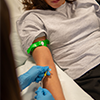
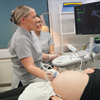



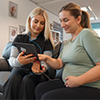


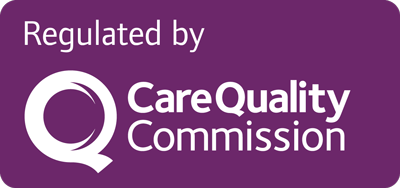

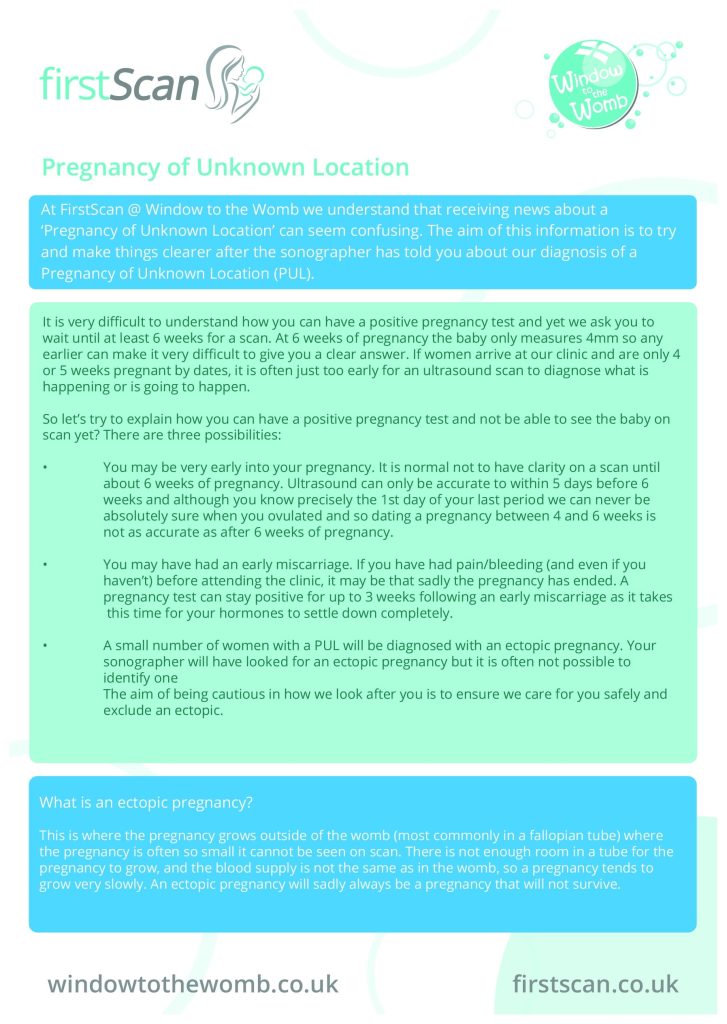
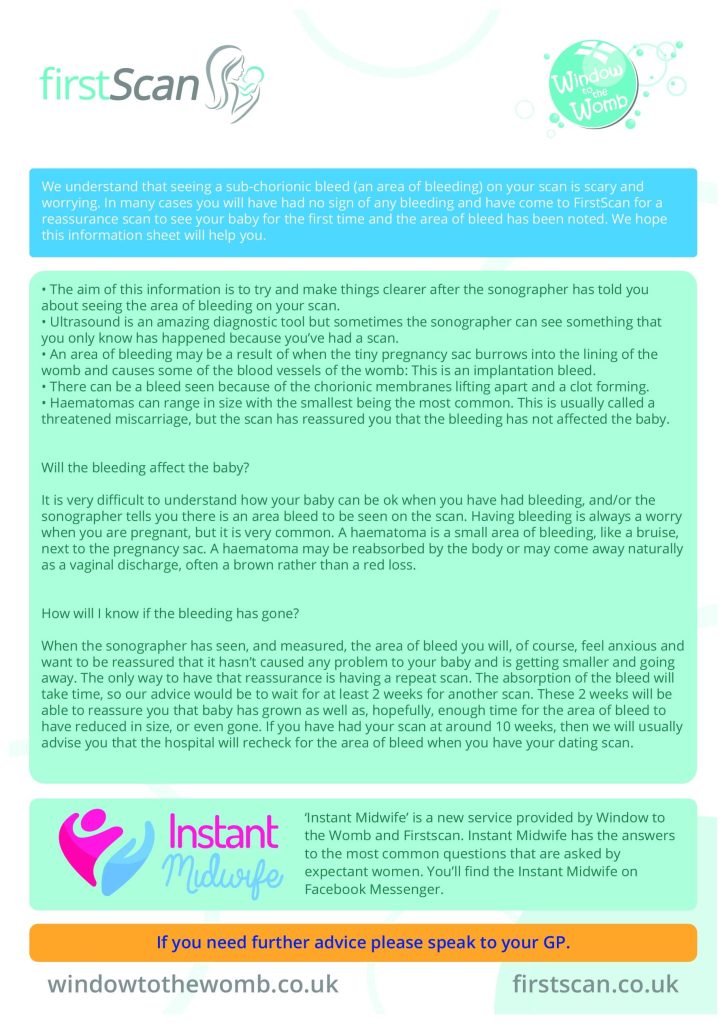
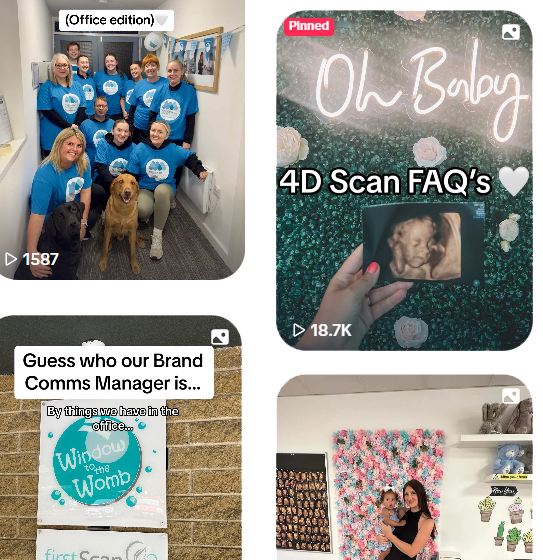

 Packages & Prices
Packages & Prices  Important Info & Policies
Important Info & Policies  Your Scan
Your Scan